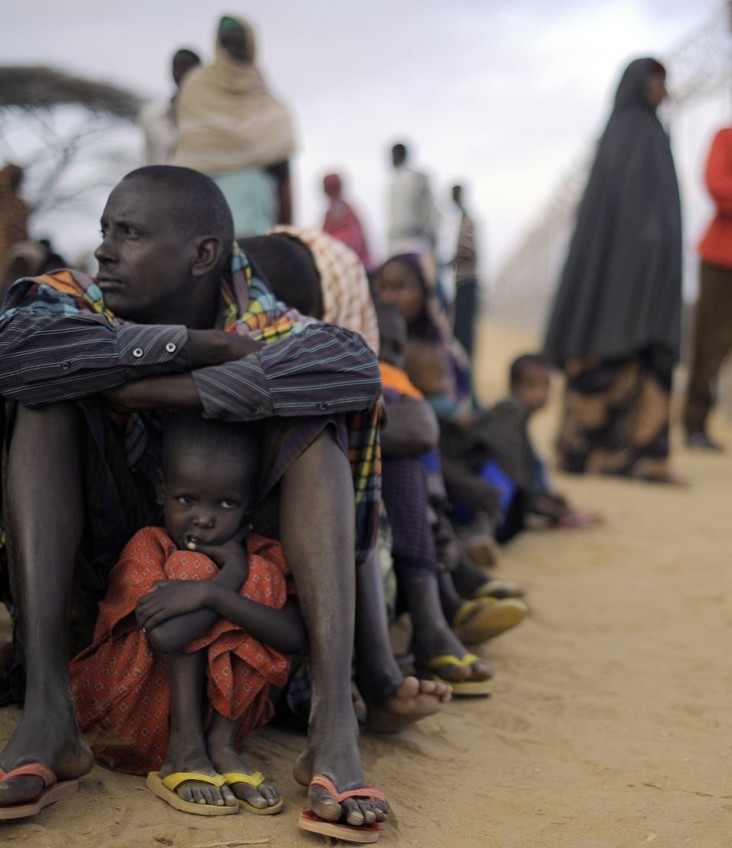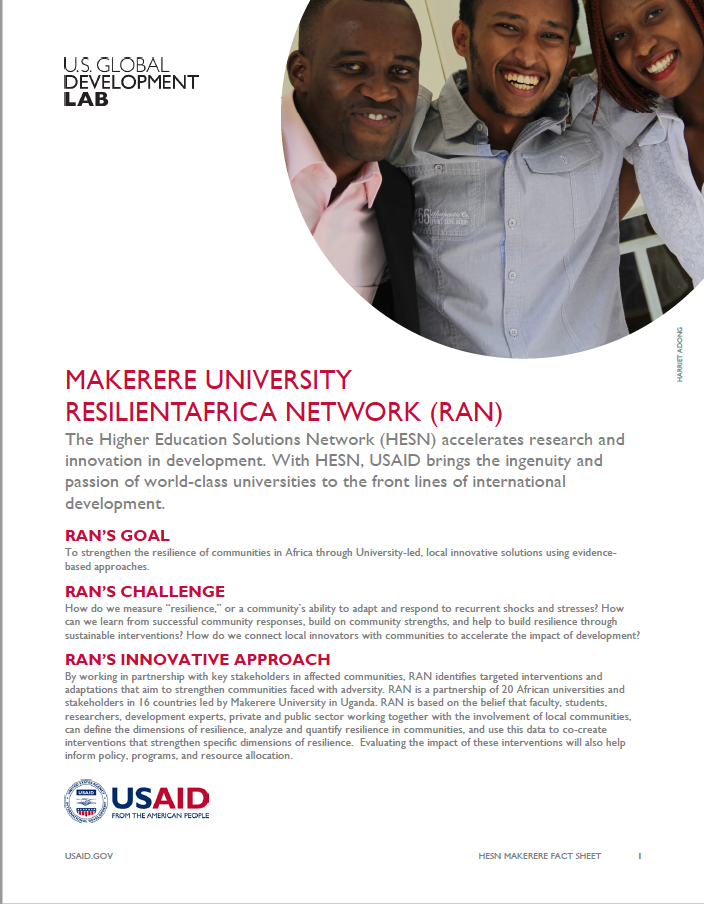- What We Do
- Agriculture and Food Security
- Democracy, Human Rights and Governance
- Economic Growth and Trade
- Education
- Ending Extreme Poverty
- Environment and Global Climate Change
- Gender Equality and Women's Empowerment
- Global Health
- Water and Sanitation
- Working in Crises and Conflict
- U.S. Global Development Lab

RAN's Goal
To strengthen the resilience of communities in Africa through University-led, local innovative solutions using evidence-based approaches.
RAN's Challenge
How do we measure “resilience,” or a community’s ability to adapt and respond to recurrent shocks and stresses? How can we learn from successful community responses, build on community strengths, and help to build resilience through sustainable interventions? How do we connect local innovators with communities to accelerate the impact of development?
RAN's Innovative Approach
By working in partnership with key stakeholders in affected communities, RAN identifies targeted interventions and adaptations that aim to strengthen communities faced with adversity. RAN is a partnership of 20 African universities and stakeholders in 16 countries led by Makerere University in Uganda. RAN is based on the belief that faculty, students, researchers, development experts, private and public sector working together with the involvement of local communities, can define the dimensions of resilience, analyze and quantify resilience in communities, and use this data to co-create interventions that strengthen specific dimensions of resilience. Evaluating the impact of these interventions will also help inform policy, programs, and resource allocation.
Makerere University - ResilientAfrica Network (RAN) ![]() (pdf - 4 MB)
(pdf - 4 MB)
RAN has engaged 28 communities across Africa in community consultations to identify dimensions of their resilience and needs to inform innovation. In 2015, RAN and its core partners (Tulane University’s Disaster Resilience Leadership Academy, Stanford University, and the Center for Strategic and International Studies) released the first annual State of African Resilience report, identifying key dimensions of resilience within unique regional contexts. RAN’s resilience framework also outlines key entry points and promising approaches for strengthening resilience within target communities, highlighting where development professionals can hope to achieve the most positive and transformative impact.
RAN is equipping those communities and local stakeholders with innovations, tools and resources to more effectively respond to and recover from complex challenges by identifying local solutions, catalyzing successful ones, and rolling them out to other vulnerable communities.
RAN casts a wide net for good ideas through three main approaches:
- Crowdsourcing innovation -- RAN crowd-sources innovations with the highest potential to impact resilience. Selected innovators are invited to compete at events or exhibitions and receive mentoring/ assistance through the Resilience Innovation Acceleration Program (RIAP).
- Prioritizing community needs -- Through themed Open Resilience Innovation Challenges (RIC), RAN funds new ideas and innovations that address the unique needs of local communities.
- Co-creation -- Through a process called Collaborative Resilience Innovation Design (CRID), RAN convenes experts and guides them through a co-creation process to design projects that address multiple system-level problems.
Examples of innovations include; RootIO-a community radio powered by a mobile phone, Electronic Dollar a Day (EDAD)-‘the wonder savings box’, Village Egg Bank-‘an egg at a time’, Low Cost Solar powered Irrigation Pump, PedalTap-‘an affordable hands free foot operated water dispensing system, Trust Insects for Food (TIFF) in Dikgale Community of Limpopo Province in South Africa, the Mopane Worm for Improved Income Generation (MW4IIG) project in Beitbridge, Zimbabwe by Ruzivo Trust, Innovative Rainwater Harvesting (RWH) Technologies to Improve Access to Safe Water in Borana Zone, Ethiopia and Grass Fuel project, an alternative to wood fuel also known as charcoal to save depletion of the forest reserves in the Kasena-Nankana District in the upper East Region of Ghana among others.
Regional Labs
The Eastern Africa RI Lab at Makerere University examines communities’ resilience in response to climate change and chronic conflict in Uganda, Rwanda, the Democratic Republic of the Congo and Tanzania. Partners: Gulu University; National University of Rwanda; University of Kinshasa, and Muhimbili University.
The Horn of Africa RI Lab at Jimma University in Ethiopia focuses on strengthening resilience on the effects of recurrent drought and chronic displacement. The lab funds projects examining these recurrent effects and works closely with innovators to design solutions. Partners: University of Addis Ababa, Benadir University, and University of Nairobi.
The Southern Africa RI Lab at the University of Pretoria in South Africa concentrates on the impact of chronic diseases including HIV/AIDS, access to livelihood assets, and local adaptive strategies in Malawi, South Africa, and Zimbabwe. The lab also funds projects on food security and improved income generation. Partners: University of Limpopo and Lilongwe University of Agriculture and Natural Resources.
The West Africa RI Lab at the University for Development Studies in Ghana focuses on strengthening the resilience of communities responding to rapid urbanization and food insecurity in Ghana, Senegal, and Mali. Partners: University of Bamako, University of Education, and the University of Dakar.
For more information
www.ranlab.org • twitter.com/AfricaResilient
The Higher Education Solutions Network (HESN) accelerates research and innovation in development. With HESN, USAID brings the ingenuity and passion of world-class universities to the front lines of international development. Since 2012, HESN has supported Development Labs at seven universities that engage students, researchers, faculty, and their partners in innovating scientific and technological approaches to the world's most challenging development problems. By evaluating and field-testing approaches in partnership with local institutions, HESN Development Labs identify solutions that are efficient, cost-effective, accessible, and sustainable, then strategize how to apply them on a large scale. With funding over five years from USAID and matching investments from the universities, the HESN network has grown into a vibrant collaboration among more than 650 partner institutions in academia, civil society, and government in more than 65 countries.








Comment
Make a general inquiry or suggest an improvement.